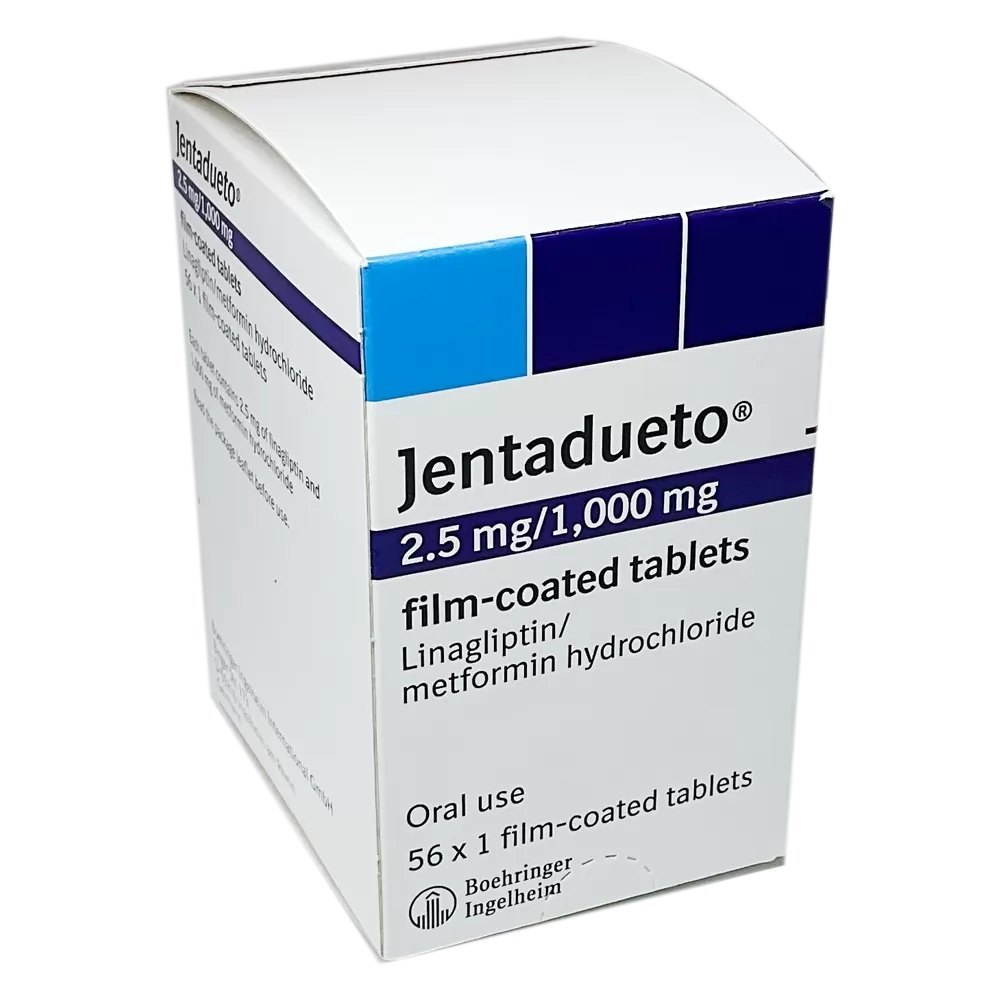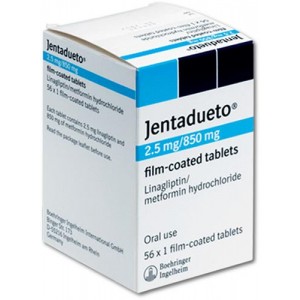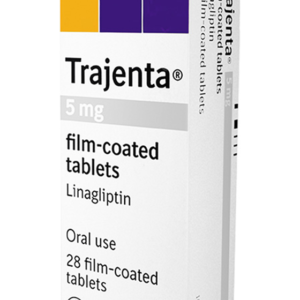What is Jentadueto?
How does it work?
Jentadueto combines two antihyperglycemic drugs with complementary mechanisms of action to improve glycemic control in patients with type 2 diabetes: linagliptin, a dipeptidyl peptidase 4 (DPP-4) inhibitor, and metformin hydrochloride, a member of the class of biguanides. . . . . . . . . . . . . . . . . . . . . . . . . . . . . . . . . . . . . . . . ............. ........................
Linagliptin
Linagliptin is an inhibitor of the enzyme DPP-4 (dipeptidyl peptidase 4), an enzyme that is involved in the inactivation of the incretin hormones GLP-1 (glucagon-like peptide 1) and GIP (glucose-dependent insulinotropic polypeptide). These hormones are rapidly broken down by the enzyme DPP-4. Both incretin hormones are involved in the physiological regulation of glucose homeostasis. Incretins secrete at a low basal level throughout the day and their levels increase immediately after food intake. GLP-1 and GIP increase biosynthesis and insulin secretion by pancreatic beta cells in the presence of normal and elevated blood glucose levels. In addition, GLP-1 also reduces glucagon secretion by pancreatic alpha cells, resulting in reduced hepatic glucose production. Linagliptin reversibly binds DPP-4 very effectively and thus leads to a sustained increase and a prolongation of the levels of active incretin. Linagliptin increases insulin secretion and decreases glucagon secretion in a glucose-dependent manner, leading to an overall improvement in glucose homeostasis. Linagliptin selectively binds to DPP-4 and exhibits an in vitro selectivity of> 10,000-fold against DPP-8 or DPP-9 activity.
Metformin
Metformin hydrochloride is a biguanide with antihyperglycemic effects that reduces both basal and postprandial plasma glucose. It does not stimulate insulin secretion and therefore does not cause hypoglycemia.
Metformin hydrochloride can act by 3 mechanisms:
- by decreased hepatic glucose production by inhibiting gluconeogenesis and glycogenolysis,
- in muscle, increasing insulin sensitivity, improving peripheral glucose uptake and utilization and delaying the intestinal absorption of glucose.
What are the benefits of taking it?
Jentadueto is indicated in adults with type 2 diabetes mellitus as a treatment associated with diet and exercise to improve glycemic control:
- in patients not adequately controlled only with their maximum tolerated dose of metformin
- in combination with other medicines for the treatment of diabetes, including insulin, in patients not adequately controlled with metformin and with these medicines
- in patients already being treated with the combination of linagliptin and metformin in separate tablets.
How do I use it and its dosage?
Always use this diabetes medication exactly as your doctor or pharmacist has told you. If in doubt, consult your doctor or pharmacist again.
How much to take
The amount of Jentadueto you will take varies depending on your situation and the doses of metformin and/or individual linagliptin and metformin tablets you are currently taking. Your doctor will tell you exactly what dose of this medicine to take.
How to take this medicine
one tablet twice daily by mouth at the dose prescribed by your doctor.
with food to reduce the likelihood of stomach discomfort.
You should not exceed the maximum recommended daily dose of 5 mg of linagliptin and 2,000 mg of metformin hydrochloride.
Keep taking Jentadueto as long as your doctor prescribes it to help you control your blood sugar level. Your doctor may prescribe this medicine along with other oral antidiabetic medicines or insulin. Remember to take all medications as directed by your doctor to get the best results for your health.
During treatment with Jentadueto, you should continue with your diet and take care that the carbohydrate intake is distributed equally throughout the day. If you are overweight, continue your low-calorie diet as directed. This medication is unlikely to cause an abnormal drop in blood sugar (hypoglycemia) only. When Jentadueto is used together with a medicine containing a sulfonylurea or insulin, a drop in blood sugar may occur and your doctor may reduce the dose of your sulfonylurea or insulin.
Side effects & precautions
Like all medicines, this medicine can cause side effects, although not everybody gets them.
Some symptoms require immediate medical attention
Stop taking Jentadueto and see your doctor quickly if you experience the following symptoms of low blood sugar (hypoglycemia): tremor, sweating, anxiety, blurred vision, tingling of the lips, paleness, mood swings, or confusion. Hypoglycemia (frequency: very common (may affect more than 1 in 10 people)) is an identified adverse effect for the combination of Jentadueto plus sulfonylurea and for the combination of Jentadueto plus insulin.
Jentadueto can cause a very rare side effect (may affect up to 1 user in 10,000), but a very serious one, called lactic acidosis. If this happens to you, you should stop taking Jentadueto and contact a doctor or the nearest hospital immediately, as lactic acidosis can lead to a coma.
Some patients have experienced inflammation of the pancreas (pancreatitis; rare frequency, may affect up to 1 in 1,000 people).
Stop taking Jentadueto and see a doctor immediately if you notice any of the following serious side effects:
Persistent and severe pain in the abdomen (stomach area), which can be reflected in the back, as well as nausea and vomiting, as this could be an indication of an inflamed pancreas (pancreatitis).
Some patients have experienced the following side effects while taking Jentadueto:
Common (may affect up to 1 in 10 people): diarrhea, increased enzymes in the blood (increased lipase), feeling unwell (nausea).
Uncommon: inflammation of the nose or throat (nasopharyngitis), cough, loss of appetite (decreased appetite), vomiting, increased blood enzymes (increased amylase), itching (pruritus).
Rare: blisters on the skin (bullous pemphigoid).
Some patients have experienced the following side effects while taking Jentadueto with insulin:
Uncommon: disorders of liver function, constipation.
Adverse effects when taking metformin alone, which were not described for Jentadueto:
- Very common: abdominal pain.
- Common (may affect up to 1 in 10 people): metallic taste (altered taste).
- Very rare (may affect up to 1 in 10,000 people): reduced vitamin B12 levels, hepatitis (a problem with your liver), skin reactions such as redness of the skin (erythema).








Reviews
There are no reviews yet.